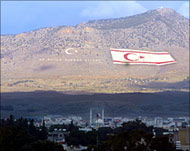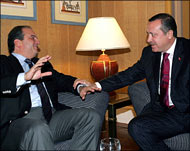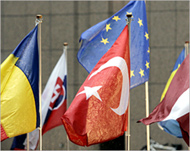EU presses Turkey to accept Cyprus
The European Union has spelled out tough conditions for Turkey to start membership talks next October ahead of final bargaining with the Turkish prime minister at a landmark summit.

The 25 EU leaders agreed on Thursday on a historic offer to open accession negotiations on 3 October 2005 but insisted Turkey, a key NATO ally, must move towards normalising relations with Cyprus by then – an acutely sensitive point for Ankara.
Turkish Prime Minister Tayyip Erdogan met Dutch Prime Minister Jan Peter Balkenende for new talks after an earlier attempt to break the deadlock failed, but his delegation said they doubted the EU would back down on Cyprus.
A draft final summit statement circulated by the Dutch presidency hours after that meeting made it clear the EU expected Turkey to initial an accord on Friday giving Cyprus de facto recognition and sign it before Ankara opens membership talks.
Amid signs Erdogan would return home without signing any accord, EU leaders proposed giving Turkey more time to move towards recognising Cyprus, diplomats said.
A Turkish official denied media reports that Erdogan was preparing to go home, telling reporters there was still a possibility for progress in the talks on terms for Turkey to start EU membership negotiations next year.
By mid-afternoon, a Turkish diplomat said that Edogan and the EU had reached an agreement on a draft of the EU offer.
Talks opposed
With talks faltering at one point, Turkey‘s main opposition party on Friday urged Erdogan to suspend accession talks with the EU, arguing that the bloc is not ready to admit the country as a full member.
 |
|
EU members want Ankara to |
Deniz Baykal, leader of the main opposition centre-left Republican People’s Party (CHP), described as “unacceptable” an EU demand for Turkey to endorse the internationally recognised Greek Cypriot government of EU member Cyprus, with which Ankara has no diplomatic ties.
“What can be done in response to this injustice? Our proposal is to freeze the talks,” the CHP leader told reporters.
“We understand that the EU is not yet ready to announce a decision to admit Turkey as a full member,” Baykal said. “The route that we are offered will not lead Turkey to full membership.”
Disappointment
“There is disappointment on the Turkish side. Chances to make important changes to the draft appear slim,” a Turkish official said on condition of anonymity.
Swedish Prime Minister Goran Persson insisted: “It’s up to Turkey to decide if they want to be members. We can invite them but we have some conditions.”
 |
|
Erdogan (R) has been meeting |
The draft, obtained by Reuters, said Turkey must sign a protocol extending its EU association agreement to the 10 new member states, including Cyprus, before entry talks start.
A British diplomat played down the political significance, saying: “This is not about recognition, explicit or implicit. It’s a technical, not a political act.”
Many countries had legally binding agreements with entities such as the Palestinian Authority or Taiwan without recognising them as states, he said.
No agreement
But a Turkish official said Erdogan had told Balkenende: “You are choosing 600,000 Greeks (Cypriots) over 70 million Turks, and I cannot explain this to my people.”
|
“You are choosing 600,000 Greeks over 70 million Turks and I cannot explain this to my people” Turkish official quoting Turkish Prime Minister Tayyip Erdogan |
Balkenende, who is chairing the summit, said his two hour night-time talks with Erdogan had been “a business-like conversation” but had not produced an agreement. Erdogan said they would meet again at 8.30am (0730 GMT) after a few hours’ rest.
Turkey’s supporters say bringing the vast, mainly agrarian country on the cusp of Europe and the Middle East, viewed by Washington and others as a key Western ally, would spread stability and security, and promote dialogue with the Islamic world by taking in a vibrant predominantly Muslim democracy.
Opponents say it is too big, too populous, too poor and too culturally different to integrate into the EU, and the bloc risks “enlarging itself to death” by extending its borders to Iran, Iraq and Syria.
‘Open-ended process’
The summit draft said the shared aim of the talks would be accession, rather than any privileged partnership, but it would be “an open-ended process, the outcome of which cannot be guaranteed beforehand”.
 |
|
Turkish accession is unpopular in |
If an applicant was unable to meet all criteria for membership, “it must be ensured that the Candidate State concerned is fully anchored in the European structures through the strongest possible bond,” the text said.
Despite their differences, EU leaders agreed to offer a date to start accession talks more than 40 years after Ankara signed an association deal as a first step to membership in 1963.
“Tonight the European Union has opened its door to Turkey,” European Commission President Jose Manuel Barroso told a summit news conference on Thursday night. “I genuinely believe that this is an offer that Turkey should be glad to accept.”
But the draft, which may be amended in the leaders’ final session, contained conditions not applied to past candidates in response to widespread public concern about the cost of integrating Turkey and risk of a mass influx of cheap labour.
It mentioned a possible permanent emergency brake on labour migration – another highly sensitive issue for the Turks – even though that clause did not mention Turkey by name.
Sensitive issue
“Long transition period, derogations, specific arrangements or permanent safeguard clauses may be considered. The Commission will include these, as appropriate, in its proposals for each framework, for areas such as freedom of movement of persons, structural policies (regional aid) or agriculture,” the draft said.
 |
|
Talks between Erdogan and EU |
The most sensitive issue was Cyprus, the east Mediterranean island divided into Greek and Turkish sectors which has eluded 30 years of diplomatic efforts at a solution.
On Thursday, Turkish leaders blew hot and cold, with Erdogan saying he could make some move on Cyprus but Foreign Minister Abdullah Gul ruling out direct or indirect recognition.
Turkey has insisted in the past that recognition depends on a settlement to reunite the island under a UN peace plan which Turkey and the Turkish Cypriots accepted but Greek Cypriots rejected in April. Ankara has 35,000 troops on the island.
Deeply unpopular
Balkenende acknowledged there were differences among members on Turkey’s candidacy. Polls show Turkish accession is deeply unpopular in West European heavyweights France and Germany.
Turkey, which plunged into its worst recession since 1945 after twin financial crises in 2000-2001, cannot join the EU until 2015 at the earliest but hopes entry talks will encourage foreign investors.
Earlier this week Ankara struck a deal with the International Monetary Fund on a new $10 billion loan.